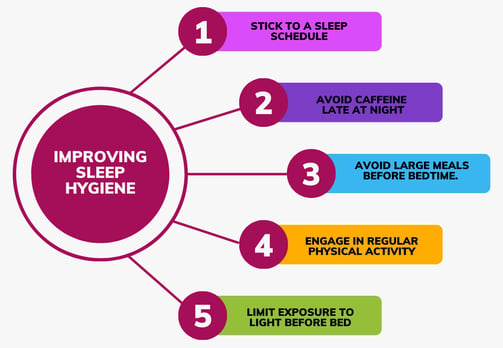Sleep Deprivation: The Silent Health Killer You Can’t Afford to Ignore
We’ve all had those sleepless nights, but did you know that chronic sleep deprivation can seriously harm your health?
Key Facts:
Insufficient sleep weakens the immune system, increasing vulnerability to illnesses (Sleep Foundation).
Quality sleep improves cognitive function, mood, and overall mental health (Harvard Medical School).
Around 30% of the world’s population suffers from insomnia at some point in their life (World Health Organization).
Sleep disorders such as sleep apnea are linked to higher risks of hypertension and stroke (American Academy of Sleep Medicine).
Sleep is an essential pillar of health, yet millions of people worldwide suffer from sleep deprivation. While it's easy to overlook, the effects of poor sleep are profound, affecting physical, mental, and emotional well-being. In this article, we'll explore the latest research on sleep disorders and their impact on various health issues.
The Science of Sleep
Sleep isn’t just about resting. It’s a complex process that helps your body and mind repair and rejuvenate. Sleep happens in cycles: REM (Rapid Eye Movement) and non-REM. Each stage plays a crucial role in physical repair, immune function, and memory consolidation (NINDS). Without enough sleep, your body can’t perform these vital functions, leading to serious health consequences.

The Impact on Physical Health
Heart Health and Sleep
Poor sleep is a big enemy of your heart. Chronic sleep deprivation can lead to heart disease, hypertension, and stroke (AHA). People with sleep apnea experience interrupted breathing, which stresses the heart.


Increased Risk of Diabetes
Sleep impacts how your body handles insulin. Short-term sleep deprivation can lead to insulin resistance, a precursor to diabetes (The Lancet).
Weight Gain and Obesity
Lack of sleep messes with hormones that control hunger, leading to overeating and weight gain. Over time, this can cause obesity, which brings its own health issues (Nature Reviews Endocrinology).
Weakened Immune System
Sleep is crucial for immune function. Without enough sleep, you’re more likely to get sick and take longer to recover (NIH).


Improving Your Sleep Hygiene
Thankfully, there are practical steps to improve sleep quality. The CDC recommends maintaining a consistent sleep schedule, creating a relaxing bedtime routine, and limiting screen time before bed. Here are more tips:
Keep your bedroom dark and quiet.
Avoid caffeine and large meals before bedtime.
Engage in regular physical activity.


Conclusion
The importance of sleep can’t be overstated. From heart health to cognitive function and emotional stability, quality sleep is essential for overall well-being. By prioritizing good sleep hygiene and seeking help for sleep disorders, you can enhance your quality of life.
Emotional Regulation
Lack of sleep can make you emotionally unstable, leading to irritability and mood swings. Quality sleep, however, supports emotional balance and resilience (UC Berkeley).
Sleep and Chronic Disease Prevention
Alzheimer's Disease
Poor sleep can lead to the build-up of beta-amyloid in the brain, a protein linked to Alzheimer's disease (NIA).
Cancer Risk
Shift workers with irregular sleep patterns face a higher risk of cancer due to disruptions in circadian rhythms (WHO).
Autoimmune Diseases
Inadequate sleep can exacerbate autoimmune diseases like rheumatoid arthritis and lupus (Nature Reviews Immunology).
Mental Health Impacts
Cognitive Function and Mental Health
Sleep deprivation affects your brain's ability to focus, make decisions, and solve problems (Harvard Medical School). It also hinders memory consolidation, which is essential for students and professionals.
Explore More

Subscribe
Get new blogs in your Emails




